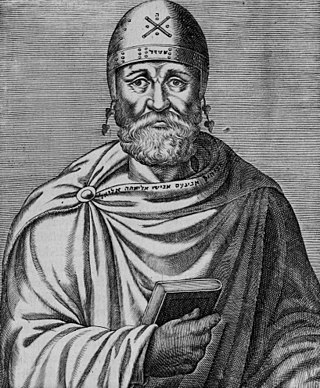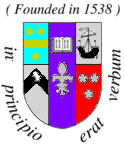Related Research Articles
Arianism is a Christological doctrine considered heretical by all modern mainstream branches of Christianity. It is first attributed to Arius, a Christian presbyter who preached and studied in Alexandria, Egypt. Arian theology holds that Jesus Christ is the Son of God, who was begotten by God the Father with the difference that the Son of God did not always exist but was begotten/made before time by God the Father; therefore, Jesus was not coeternal with God the Father, but nonetheless Jesus began to exist outside time.

Polyphony is a type of musical texture consisting of two or more simultaneous lines of independent melody, as opposed to a musical texture with just one voice (monophony) or a texture with one dominant melodic voice accompanied by chords (homophony).

Pope St. Dionysius was the bishop of Rome from 22 July 259 CE to his death on 26 December 268. His task was to reorganise the Catholic Church, after the persecutions of Emperor Valerian I, and the edict of toleration by his successor Gallienus. He also helped rebuild the churches of Cappadocia, devastated by the marauding Goths.

Philo of Alexandria, also called Philō Judæus, was a Hellenistic Jewish philosopher who lived in Alexandria, in the Roman province of Egypt.
Nontrinitarianism is a form of Christianity that rejects the mainstream Christian theology of the Trinity—the belief that God is three distinct hypostases or persons who are coeternal, coequal, and indivisibly united in one being, or essence. Certain religious groups that emerged during the Protestant Reformation have historically been known as antitrinitarian.

The Eye of Providence or All-Seeing Eye is a symbol depicting an eye, often enclosed in a triangle and surrounded by a ray of light or a halo, intended to represent Providence, as the eye watches over the workers of mankind. A well-known example of the Eye of Providence appears on the reverse of the Great Seal of the United States, which is depicted on the United States one-dollar bill.

The Christian Methodist Episcopal Church (C.M.E.C.) is a Methodist denomination that is based in the United States. It adheres to Wesleyan-Arminian theology. Though historically a part of the black church, the Christian Methodist Episcopal today has a church membership of people from all racial backgrounds.

The VRT is the national public service broadcaster for the Flemish Community of Belgium.
Miaphysitism is the Christological doctrine that holds Jesus, the "Incarnate Word, is fully divine and fully human, in one 'nature' (physis)." It is a position held by the Oriental Orthodox Churches and differs from the Chalcedonian position that Jesus is one "person" in two "natures", a divine nature and a human nature (dyophysitism).

Sophia is a central idea in Hellenistic philosophy and religion, Platonism, Gnosticism and Christian theology. Originally carrying a meaning of "cleverness, skill", the later meaning of the term, close to the meaning of phronesis, was significantly shaped by the term philosophía as used by Plato.

St Mary's College, founded as New College or College of the Assumption of the Blessed Virgin Mary, is the home of the Faculty and School of Divinity within the University of St Andrews, in Fife, Scotland.

In Christian theology, the doctrine of incarnation teaches that the pre-existent divine person of Jesus Christ, God the Son, the second person of the Trinity, and the eternally begotten Logos, took upon human nature and "was made flesh" by being conceived in the womb of a woman, the Virgin Mary, also known as the Theotokos. The doctrine of the incarnation then entails that Jesus was at the same time both fully God and fully human.

The Pammakaristos Church, also known as the Church of Theotokos Pammakaristos, is one of the most famous Byzantine church buildings in Istanbul, Turkey, and was the last pre-Ottoman building to house the Ecumenical Patriarchate. Converted in 1591 into the Fethiye Mosque, it is today partly a museum housed in a side chapel or parekklesion. One of the most important examples of Constantinople's Palaiologan architecture, the mosque contains the largest quantity of Byzantine mosaics in Istanbul after the Hagia Sophia and The Chora.

The "three angels' messages" is an interpretation of the messages given by three angels in Revelation 14:6–12. The Seventh-day Adventist church teaches that these messages are given to prepare the world for the second coming of Jesus Christ, and sees them as a central part of its own mission.

The Service Book and Hymnal (SBH) was used by most of the Lutheran church bodies in the United States that today compose the Evangelical Lutheran Church in America (ELCA) prior to the publishing of the Lutheran Book of Worship (LBW) of 1978. In ELCA circles, historically, the Service Book and Hymnal has been called the "red book" while the Lutheran Book of Worship has been called the "green book." The newest ELCA hymnal, Evangelical Lutheran Worship (ELW) is also red in color, and has apparently been dubbed "the cranberry book".

East Passyunk Crossing is a neighborhood in South Philadelphia, Pennsylvania, United States. Its location is considered to be from Tasker Street to Snyder Avenue and Broad Street to 6th Street.

The BioLogos Foundation is a Christian advocacy group that supports the view that God created the world using evolution of different species as the mechanism. It was established by Francis Collins in 2007 after receiving letters and emails from people who had read his book, The Language of God. The primary audience was Christians in the beginning, but Collins as well as later leaders of the organization have sought to engage with scientific skeptics as well as general audiences invested in biological science.

The Armenian eternity sign or Arevakhach is an ancient Armenian national symbol and a symbol of the national identity of the Armenian people. It is one of the most common symbols in Armenian architecture, carved on khachkars and on walls of churches.

The Cleveland Indians name and logo controversy referred to the controversy surrounding the club name and logo previously used by Major League Baseball's Cleveland Guardians, an American professional baseball team based in Cleveland, Ohio.
References
- ↑ "Address data base of Reformed churches and institutions". www.reformiert-online.net. Archived from the original on 3 September 2019. Retrieved 27 May 2021.